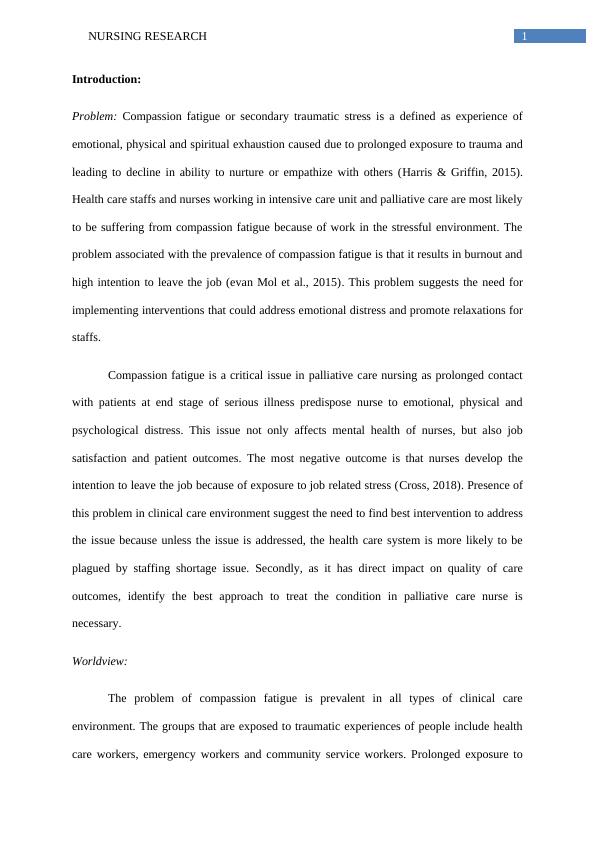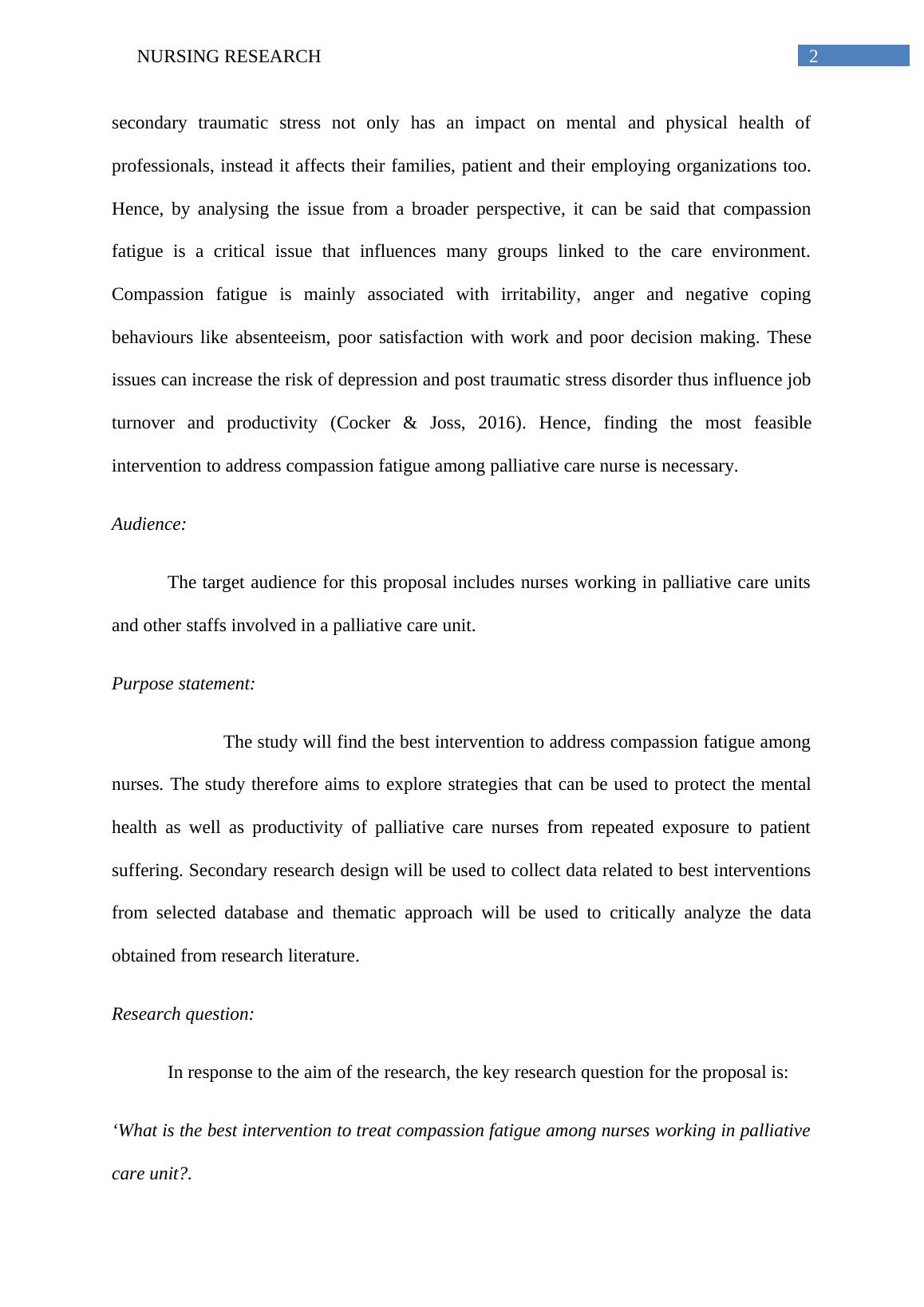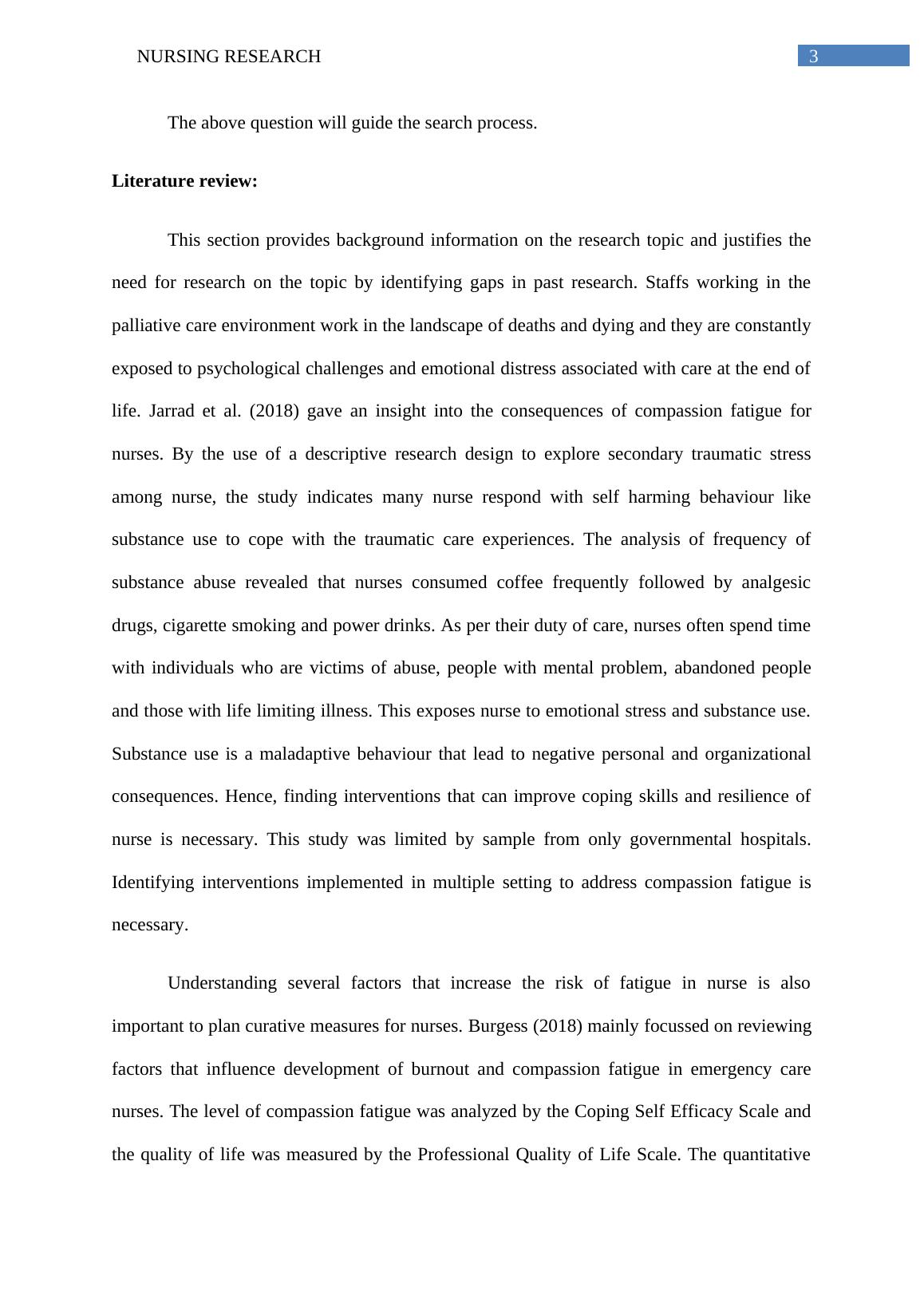Best Intervention for Compassion Fatigue in Palliative Care Nurses
Added on 2023-04-11
12 Pages2844 Words273 Views
Running head: NURSING RESEARCH
Nursing research
Name of the student:
Name of the University:
Author’s note
Nursing research
Name of the student:
Name of the University:
Author’s note

1NURSING RESEARCH
Introduction:
Problem: Compassion fatigue or secondary traumatic stress is a defined as experience of
emotional, physical and spiritual exhaustion caused due to prolonged exposure to trauma and
leading to decline in ability to nurture or empathize with others (Harris & Griffin, 2015).
Health care staffs and nurses working in intensive care unit and palliative care are most likely
to be suffering from compassion fatigue because of work in the stressful environment. The
problem associated with the prevalence of compassion fatigue is that it results in burnout and
high intention to leave the job (evan Mol et al., 2015). This problem suggests the need for
implementing interventions that could address emotional distress and promote relaxations for
staffs.
Compassion fatigue is a critical issue in palliative care nursing as prolonged contact
with patients at end stage of serious illness predispose nurse to emotional, physical and
psychological distress. This issue not only affects mental health of nurses, but also job
satisfaction and patient outcomes. The most negative outcome is that nurses develop the
intention to leave the job because of exposure to job related stress (Cross, 2018). Presence of
this problem in clinical care environment suggest the need to find best intervention to address
the issue because unless the issue is addressed, the health care system is more likely to be
plagued by staffing shortage issue. Secondly, as it has direct impact on quality of care
outcomes, identify the best approach to treat the condition in palliative care nurse is
necessary.
Worldview:
The problem of compassion fatigue is prevalent in all types of clinical care
environment. The groups that are exposed to traumatic experiences of people include health
care workers, emergency workers and community service workers. Prolonged exposure to
Introduction:
Problem: Compassion fatigue or secondary traumatic stress is a defined as experience of
emotional, physical and spiritual exhaustion caused due to prolonged exposure to trauma and
leading to decline in ability to nurture or empathize with others (Harris & Griffin, 2015).
Health care staffs and nurses working in intensive care unit and palliative care are most likely
to be suffering from compassion fatigue because of work in the stressful environment. The
problem associated with the prevalence of compassion fatigue is that it results in burnout and
high intention to leave the job (evan Mol et al., 2015). This problem suggests the need for
implementing interventions that could address emotional distress and promote relaxations for
staffs.
Compassion fatigue is a critical issue in palliative care nursing as prolonged contact
with patients at end stage of serious illness predispose nurse to emotional, physical and
psychological distress. This issue not only affects mental health of nurses, but also job
satisfaction and patient outcomes. The most negative outcome is that nurses develop the
intention to leave the job because of exposure to job related stress (Cross, 2018). Presence of
this problem in clinical care environment suggest the need to find best intervention to address
the issue because unless the issue is addressed, the health care system is more likely to be
plagued by staffing shortage issue. Secondly, as it has direct impact on quality of care
outcomes, identify the best approach to treat the condition in palliative care nurse is
necessary.
Worldview:
The problem of compassion fatigue is prevalent in all types of clinical care
environment. The groups that are exposed to traumatic experiences of people include health
care workers, emergency workers and community service workers. Prolonged exposure to

2NURSING RESEARCH
secondary traumatic stress not only has an impact on mental and physical health of
professionals, instead it affects their families, patient and their employing organizations too.
Hence, by analysing the issue from a broader perspective, it can be said that compassion
fatigue is a critical issue that influences many groups linked to the care environment.
Compassion fatigue is mainly associated with irritability, anger and negative coping
behaviours like absenteeism, poor satisfaction with work and poor decision making. These
issues can increase the risk of depression and post traumatic stress disorder thus influence job
turnover and productivity (Cocker & Joss, 2016). Hence, finding the most feasible
intervention to address compassion fatigue among palliative care nurse is necessary.
Audience:
The target audience for this proposal includes nurses working in palliative care units
and other staffs involved in a palliative care unit.
Purpose statement:
The study will find the best intervention to address compassion fatigue among
nurses. The study therefore aims to explore strategies that can be used to protect the mental
health as well as productivity of palliative care nurses from repeated exposure to patient
suffering. Secondary research design will be used to collect data related to best interventions
from selected database and thematic approach will be used to critically analyze the data
obtained from research literature.
Research question:
In response to the aim of the research, the key research question for the proposal is:
‘What is the best intervention to treat compassion fatigue among nurses working in palliative
care unit?.
secondary traumatic stress not only has an impact on mental and physical health of
professionals, instead it affects their families, patient and their employing organizations too.
Hence, by analysing the issue from a broader perspective, it can be said that compassion
fatigue is a critical issue that influences many groups linked to the care environment.
Compassion fatigue is mainly associated with irritability, anger and negative coping
behaviours like absenteeism, poor satisfaction with work and poor decision making. These
issues can increase the risk of depression and post traumatic stress disorder thus influence job
turnover and productivity (Cocker & Joss, 2016). Hence, finding the most feasible
intervention to address compassion fatigue among palliative care nurse is necessary.
Audience:
The target audience for this proposal includes nurses working in palliative care units
and other staffs involved in a palliative care unit.
Purpose statement:
The study will find the best intervention to address compassion fatigue among
nurses. The study therefore aims to explore strategies that can be used to protect the mental
health as well as productivity of palliative care nurses from repeated exposure to patient
suffering. Secondary research design will be used to collect data related to best interventions
from selected database and thematic approach will be used to critically analyze the data
obtained from research literature.
Research question:
In response to the aim of the research, the key research question for the proposal is:
‘What is the best intervention to treat compassion fatigue among nurses working in palliative
care unit?.

3NURSING RESEARCH
The above question will guide the search process.
Literature review:
This section provides background information on the research topic and justifies the
need for research on the topic by identifying gaps in past research. Staffs working in the
palliative care environment work in the landscape of deaths and dying and they are constantly
exposed to psychological challenges and emotional distress associated with care at the end of
life. Jarrad et al. (2018) gave an insight into the consequences of compassion fatigue for
nurses. By the use of a descriptive research design to explore secondary traumatic stress
among nurse, the study indicates many nurse respond with self harming behaviour like
substance use to cope with the traumatic care experiences. The analysis of frequency of
substance abuse revealed that nurses consumed coffee frequently followed by analgesic
drugs, cigarette smoking and power drinks. As per their duty of care, nurses often spend time
with individuals who are victims of abuse, people with mental problem, abandoned people
and those with life limiting illness. This exposes nurse to emotional stress and substance use.
Substance use is a maladaptive behaviour that lead to negative personal and organizational
consequences. Hence, finding interventions that can improve coping skills and resilience of
nurse is necessary. This study was limited by sample from only governmental hospitals.
Identifying interventions implemented in multiple setting to address compassion fatigue is
necessary.
Understanding several factors that increase the risk of fatigue in nurse is also
important to plan curative measures for nurses. Burgess (2018) mainly focussed on reviewing
factors that influence development of burnout and compassion fatigue in emergency care
nurses. The level of compassion fatigue was analyzed by the Coping Self Efficacy Scale and
the quality of life was measured by the Professional Quality of Life Scale. The quantitative
The above question will guide the search process.
Literature review:
This section provides background information on the research topic and justifies the
need for research on the topic by identifying gaps in past research. Staffs working in the
palliative care environment work in the landscape of deaths and dying and they are constantly
exposed to psychological challenges and emotional distress associated with care at the end of
life. Jarrad et al. (2018) gave an insight into the consequences of compassion fatigue for
nurses. By the use of a descriptive research design to explore secondary traumatic stress
among nurse, the study indicates many nurse respond with self harming behaviour like
substance use to cope with the traumatic care experiences. The analysis of frequency of
substance abuse revealed that nurses consumed coffee frequently followed by analgesic
drugs, cigarette smoking and power drinks. As per their duty of care, nurses often spend time
with individuals who are victims of abuse, people with mental problem, abandoned people
and those with life limiting illness. This exposes nurse to emotional stress and substance use.
Substance use is a maladaptive behaviour that lead to negative personal and organizational
consequences. Hence, finding interventions that can improve coping skills and resilience of
nurse is necessary. This study was limited by sample from only governmental hospitals.
Identifying interventions implemented in multiple setting to address compassion fatigue is
necessary.
Understanding several factors that increase the risk of fatigue in nurse is also
important to plan curative measures for nurses. Burgess (2018) mainly focussed on reviewing
factors that influence development of burnout and compassion fatigue in emergency care
nurses. The level of compassion fatigue was analyzed by the Coping Self Efficacy Scale and
the quality of life was measured by the Professional Quality of Life Scale. The quantitative

End of preview
Want to access all the pages? Upload your documents or become a member.
Related Documents
Preventing Compassion Fatigue among Palliative Care Nurseslg...
|5
|789
|332
CNA347 Practice Enhancement Streamslg...
|9
|1804
|173
Compassion Fatigue in Nursing Practice: Workplace Culture and Enabling Factorslg...
|16
|4448
|434
Compassion Fatigue among Mental Health Nurses: Prevention and Mitigation Strategieslg...
|14
|3989
|455
Assignment On Compassion Fatigue & Resilience In Healthcare Systemlg...
|8
|2241
|172
Strategies for Better Emotional Health for Nurseslg...
|8
|1264
|212
